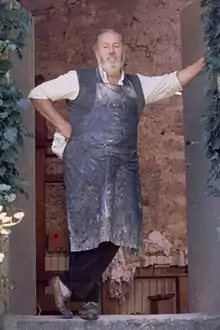Bernard Buffet
Bernard Buffet (French: [byfɛ]; 10 July 1928 – 4 October 1999) was a French painter of Expressionism and a member of the anti-abstract art group L'homme Témoin (the Witness-Man).[1]
Bernard Buffet | |
|---|---|
 Bernard Buffet in front of his studio in Tourtour | |
| Born | Bernard Buffet 10 July 1928 Paris, France |
| Died | 4 October 1999 (aged 71) Tourtour, France |
| Nationality | French |
| Education | École Nationale Supérieure des Beaux-Arts, Marie-Thérèse Auffray |
| Known for | Painting, Drawing, Printmaking |
| Movement | Expressionism |
| Awards | Member of the Salon d'Automne, 1947 Member of the Société des Artistes Indépendants, 1947 |
Life and work
Buffet was born in Paris, France, and studied art there at the École Nationale Supérieure des Beaux-Arts (National School of the Fine Arts) and worked in the studio of the painter Eugène Narbonne. Among his classmates were Maurice Boitel and Louis Vuillermoz. He met the French painter Marie-Thérèse Auffray and was influenced by her work.
Sustained by the picture-dealer Maurice Garnier, Buffet produced religious pieces, landscapes, portraits and still-lifes. In 1946, he had his first painting shown, a self-portrait, at the Salon des Moins de Trente Ans at the Galerie Beaux-Arts. He had at least one major exhibition every year. Buffet illustrated "Les Chants de Maldoror" written by Comte de Lautréamont in 1952. In 1955, he was awarded the first prize by the magazine Connaissance des Arts, which named the ten best post-war artists. In 1958, at the age of 30, the first retrospective of his work was held at the Galerie Charpentier.
Pierre Bergé was Buffet's live-in lover until Bergé[2] left Buffet for Yves Saint Laurent.
On 12 December 1958, Buffet married the writer and actress Annabel Schwob. They adopted three children.[3] Daughter Virginie was born in 1962, daughter Danielle in 1963 and son Nicolas was born in 1973. Bernard Buffet was named "Chevalier de la Légion d'Honneur" in 1973.
On 23 November 1973, the Bernard Buffet Museum was founded by Kiichiro Okano, in Surugadaira, Japan.
At the request of the French postal administration in 1978, he designed a stamp depicting the Institut et le Pont des Arts – on this occasion the Post Museum arranged a retrospective of his works.[4]
Buffet created more than 8,000 paintings and many prints as well.
Buffet committed suicide[5] at his home in Tourtour, southern France, on 4 October 1999. He was suffering from Parkinson's disease and was no longer able to work. Police said that Buffet died around 4 p.m after putting his head in a plastic bag attached around his neck with tape.
The popularity of Buffet's work, as well as the level of media attention around his lifestyle, were quite high in the 1950s and 1960s. Although he kept on painting throughout his life, there was a certain decline in interest in his work in the last decades of the 20th century, especially so in France. This decline in popularity was partly influenced by his fall from grace with French art pundits, whose support and interest shifted away from figurative art.
In the 21st century, there has been a renewed spike in interest in the work of Bernard Buffet. With some successful exhibitions in France and throughout the world. In 2016, British author Nicholas Foulkes published Bernard Buffet: The Invention of the Modern Mega-Artist, in which he offers a controversial biographical account of Buffet's life and work.
Theme exhibitions (selection)
- 1952 La Passion du Christ
- 1954 Horreur de la Guerre
- 1958 Jeanne d'Arc
- 1961 Portraits d'Annabel
- 1962 La Chapelle de Château l'Arc
- 1965 Les ecorches
- 1967 La corrida
- 1971 Les Folles
- 1977 L'enfer de Dante
- 1978 The French Revolution
- 1989 Vingt mille lieues sous les mers
- 1991 Souvenirs d'Italie
- 1991 New York
- 1992 Les Clowns Musiciens
- 1992 Saint-Petersburg
- 1993 L'Empire ou les plaisirs de la guerre
- 1993 Promenade Provencale
- 1995 Sept peches capitaux
- 1996 Pekin
- 1998 La maison
- 1999 Mes Singes
- 2000 La mort
Awards
- 1947 Member of the Salon d'Automne
- 1947 Member of the Société des Artistes Indépendants
- 1948 co-recipient of the Prix de la Critique with Bernard Lorjou
- 1950 Prix Puvis de Chavannes
- 1955 First Prize by Magazine Connaissance
- 1973 Officer of the Légion d'Honneur
- 1974 Member of the Académie des Beaux-Arts
Collections (selection)
- ARTAX, Düsseldorf
- Boca Raton Museum of Art
- Ca la Ghironda, Bologna
- Kunstmuseum Walter, Augsburg
- Musée d´art moderne de Lille, Villeneuve d´Ascq
- Museum of Contemporary Art, Skopje
- National Gallery for Foreign Art, Sofia
- National Gallery of Canada, Ottawa
- National Museum of Western Art, Tokyo
- Tampere Art Museum
- Tate Gallery, London
- Wellside Gallery, Seoul
- Alexandre de Bothuri collection, Palm Beach, USA " Le Clown Jaune" 1955
Cultural references
Film
- Bernard Buffet, a 1956 film by Étienne Périer
References
- "DuMont's Künstlerlexikon", DuMont Buchverlag Köln, Cologne, 1997
- Bernard Buffet: Return of the 'poser' – Features – Art. The Independent (16 March 2009). Retrieved on 26 July 2014.
- http://www.parismatch.com/Culture/Livres/franoise-sagan-nicolas-buffet-alcool-143654
- MMK Museum für Moderne Kunst, Frankfurt am Main, "Bernard Buffet Maler Painter Peintre", Brochure, 2008, April
- "Bernard Buffet: Return of the 'poser'". The Independent. 16 March 2009. Retrieved 28 August 2009.
External links
| Wikimedia Commons has media related to Bernard Buffet. |
- Musee Bernard Buffet
- Artnet.com
- Portrait of Bernard Buffet by Reginald Gray. Paris 1963.